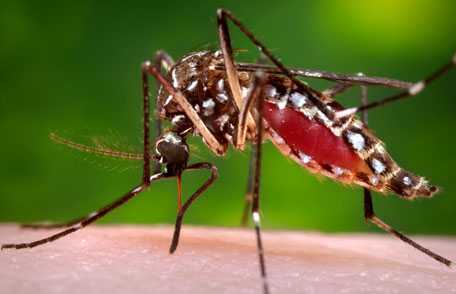Avoid Mosquito Bites
 Are you planning to travel to an area with Zika? Protect yourself and your family from mosquito bites that can make you sick.
Are you planning to travel to an area with Zika? Protect yourself and your family from mosquito bites that can make you sick.
Mosquito bites can be more than just annoying and itchy. They can make you really sick. Protect yourself and your family when traveling. Using insect repellent is the best way to prevent diseases like Zika, dengue, and chikungunya that are spread by mosquitoes.
Zika
Zika virus is primarily spread to people through mosquito bites. The most common symptoms of Zika virus disease (Zika) are fever, rash, joint pain, or conjunctivitis (red eyes). The illness is usually mild with symptoms lasting from several days to a week. Severe disease requiring hospitalization is uncommon, and deaths from Zika are very rare.
What do Zika, dengue, and chikungunya have in common?
- Zika, dengue, and chikungunya are spread to people through the bite of an infected Aedes aegypti or Aedes albopictus mosquito.
- Mosquitoes become infected with Zika, dengue, or chikungunya virus when they bite a person who is infected with one of those viruses. Infected mosquitoes can then spread one of these viruses to other people.
- There are no vaccines or medicines for these diseases.
- Once a person is infected with one of these viruses, he or she is likely to be protected from future infections.
CDC has issued a travel notice (Level 2 Alert-Practice Enhanced Precautions) for people traveling to places with Zika virus.
Because Zika can cause birth defects in babies born to women who were infected with Zika virus during pregnancy, CDC recommends the following:
- Pregnant women should not travel to any area where Zika virus is spreading.
- Pregnant women who must travel to one of these areas should talk to their doctor first and strictly follow steps to prevent mosquito bites during the trip.
- Women trying to become pregnant, and their male partners, should consult with their doctor before traveling to these areas and strictly follow steps to prevent mosquito bites during the trip.
- Zika can be passed through sex from a person who has Zika to his or her sex partners. People who have lived in or traveled to an area with Zika and who have a pregnant partner should use condoms or they should not have sex (vaginal, anal, or oral) during the pregnancy. Condoms include male or female condoms.

Planning a getaway? Don’t forget to pack your insect repellent!
Dengue
Forty percent of the world’s population lives in an area at risk for dengue and an estimated 390 million people per year are infected with the viruses. Dengue is a disease caused by one of four viruses (dengue virus 1, 2, 3, or 4), and it is possible for someone to get dengue up to four times. Dengue is a leading cause of illness and death in the tropics and subtropics.
Most people infected with dengue have mild or no symptoms. About one in four people who are infected with dengue will develop some symptoms of disease. Mild symptoms of infection begin with a fever and severe headache, pain behind the eyes, joint and muscle pain, and rash. Dengue symptoms can quickly become severe and even fatal. Early recognition of severe disease, followed by close management from a healthcare provider is critical.
Chikungunya
The most common symptoms of chikungunya virus infection (chikungunya) are sudden onset of a high fever and joint pain. Other symptoms may include headache, muscle pain, joint swelling, or rash. Infection with chikungunya virus is rarely fatal, but the joint pain can often be severe and debilitating. Most patients recover in about a week, although long-term joint pain occurs in some people. Outbreaks have occurred in countries in Africa, Asia, Europe, and the Indian and Pacific Oceans.
In late 2013, chikungunya virus was found for the first time in the Americas on islands in the Caribbean. Since then, chikungunya has spread to 45 countries and almost 2 million cases have been reported. Though chikungunya is not common in the continental United States, Puerto Rico and the U.S. Virgin Islands have had large outbreaks.

When used as directed, insect repellents are the BEST way to protect yourself and family members from getting sick from mosquito bites.
Planning a Trip? Do Your Homework Before Traveling
Make a check list of everything you’ll need for an enjoyable vacation and use the following resources to help you prepare.
- Pack a travel health kit. Remember insect repellent and use it to prevent mosquito bites.
- Learn about destination-specific health risks and recommendations by visiting CDC Travelers’ Health website.
- See a healthcare provider familiar with travel medicine, ideally 4 to 6 weeks before your trip. Go to the Find a Clinic webpage for help in finding a travel medicine clinic near you.
Prevent Mosquito Bites While Traveling
Mosquito bites are bothersome enough, but when you consider risks, like getting sick with Zika, dengue, or chikungunya, it’s important that you choose an insect repellent that works well and that you feel comfortable regularly using.
- Protect yourself when traveling: Learn about country-specific travel advice, health risks, and how to stay safe by visiting CDC Travelers’ Health website.
- Use insect repellent: Use an Environmental Protection Agency (EPA)-registered insect repellent with one of the following active ingredients. When used as directed, EPA-registered insect repellents are proven safe and effective, even for pregnant and breastfeeding women.
- DEET
- Picaridin, also known as KBR 3023, Bayrepel, and icaridin
- Oil of lemon eucalyptus (OLE) or para-menthane-diol (PMD)
- IR3535
- 2-undecanone
- Cover up: Wear long-sleeved shirts and long pants.
- Keep mosquitoes outside: Stay in places with air conditioning or that use window and door screens. If you are not able to protect yourself from mosquitoes inside your home or hotel, sleep under a mosquito bed net.
- Learn more: Travelers can learn more about mosquito bite prevention in this fact sheet [924 B].
After Your Trip
Visit your healthcare provider right away if you develop a fever, headache, rash, muscle or joint pain.
- Tell your doctor about recent international travel.
- Visit the Getting Sick after Travel webpage for more information.
- Read more about Zika
- For more information on chikungunya
- Learn more about dengue
- Learn more about protecting yourself from mosquito bites [862 KB]
- Page last reviewed: December 7, 2016
- Page last updated: December 7, 2016
- Content source:
- National Center for Emerging, Zoonotic, and Infectious Diseases, Division of Vector-Borne Diseases
- Page maintained by: Office of the Associate Director for Communication, Digital Media Branch, Division of Public Affairs




 ShareCompartir
ShareCompartir